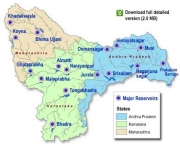/topics/society-culture-religion-and-history
Society, Culture, Religion and History
Briscoe on the Indus treaty - A response from Ramaswamy Iyer - Economic and Political Weekly
Posted on 21 Jan, 2011 09:11 AMThis paper published in the Economic and Political Weekly, provides a critique of the writings by John Briscoe on the implementation of the Indus Waters Treaty and argues that it is a biased and a one sided presentation of issues, which ridicules and ignores the attempts made by India at negotiating with Pakistan and reaching a peaceful agreement over the water issue.
24th national convention of IPHE (India) on "Water & sanitation utility services in India and their health implications" held in Bhubaneshwar
Posted on 18 Jan, 2011 11:49 PMThe 24th National Convention of Institution of Public Health Engineers (India) on the theme “Water & Sanitation Utility Services in India and their health implications” will be organised by IPHE(I), Regional Centre, Bhubaneswar during 12th -13th February,2011.
Eastern Himalaya freshwater biodiversity assessment report released by IUCN and Zoo Outreach Organisation
Posted on 18 Jan, 2011 11:44 PMDear all,
IUCN, with Zoo Outreach Organisation, have today published a new report, 'The status and distribution of freshwater biodiversity in the Eastern Himalaya', which is available online here
India s groundwater challenges and the way forward
Posted on 18 Jan, 2011 11:42 PMIndia’s Groundwater Challenge and the Way Forward
P S Vijay Shankar , Himanshu Kulkarni , Sunderrajan Krishnan
The groundwater crisis is acquiring alarming proportions in many parts of the country. Strategies to respond to groundwater overuse and deteriorating water quality must be based on a new approach involving typologising the resource problems and redefining the institutional structure governing groundwater. This approach is based on the notion of groundwater as common property.
The report of the Krishna Water Disputes Tribunal-II (2010)
Posted on 18 Jan, 2011 08:26 PM KWDT-II freshly assessed the yearly yields in the Krishna and determined the award on the basis of the yearly yield at 65 per cent dependability which was assessed at a total of 2,293 tmcft.
KWDT-II freshly assessed the yearly yields in the Krishna and determined the award on the basis of the yearly yield at 65 per cent dependability which was assessed at a total of 2,293 tmcft.
In its order, announced in an open court, the tribunal allocated a total share of 1,001 tmcft to Andhra Pradesh, 911 tmcft to Karnataka and 666 tmcft to Maharashtra with certain restrictions imposed on each State in keeping with the dependable flows of the rivers on which the allocations have been made. The allocation under the first award (KWDT I) was 811 tmcft for Andhra Pradesh, 734 tmcft for Karnataka and 585 tmcft for Maharashtra.
Managing Natural Resources -A report by IDSAsr
Posted on 18 Jan, 2011 04:24 PMThe scarcity value of natural resources has risen due to rising pressure of human population and demands made by modern economics progress. As such managing these resources has become very important.
Documentary on mining - "Niyamgiri, You are Still Alive"
Posted on 18 Jan, 2011 02:31 PMIn 2006 Sterlite, a subsidiary of UK mining company Vedanta built a refinery in Niyamgiri Hills, Orissa, India. The intention was to mine bauxite from the Niyamgiri Hills, which is in reserved forest. It is also home to indigenous communities who are dependent on it for their livelihood.
JivanVidya life-skills workshop, Feb 13 - 18, Sirsi, Karnataka
Posted on 17 Jan, 2011 02:43 PMOrganizer: Vinish Gupta, Centre for Holistic Learning
Venue: Huthina Betta campus, Sirsi
Description:
The workshop addresses the self in the human being. It draws attention to human needs - need for human relationships, inherent desire to seek knowledge, and the joy that we naturally derive from these. In our current situation, we might be seeking different things. Thus, it brings about a dialogue between what we are and what we want to be. It does not posit happiness in an after-world, but here and now, based on a "humanness" common to all human beings. The approach is rational, secular and universal.
December 2010 - January 2011: "Dams, Rivers and People" - The SANDRP newsletter
Posted on 11 Jan, 2011 01:00 PM The SANDRP newsletter for December 2010 - January 2011 continues its critical analysis of dams, irrigation and related issues:
The SANDRP newsletter for December 2010 - January 2011 continues its critical analysis of dams, irrigation and related issues:
- Water Crisis in Ramsar Wetlands of India
- India dodged UN to get climate credits?
17-30 percent hike in wages under Mahatma Gandhi NREGA - PIB Release
Posted on 10 Jan, 2011 04:49 PMArticle Courtesy: Press Information Bureau
The wage rates under MGNREGA have been increased by the Ministry of Rural Development with effect from 1st January 2011. This will result in 17-30% enhancement of wages under the premier flagship program of the UPA Government across the country. This was announced by the Union Minister for Rural Development and Panchayati Raj Dr. C.P.Joshi at a Press Conference in Krishi Bhawan here today.





